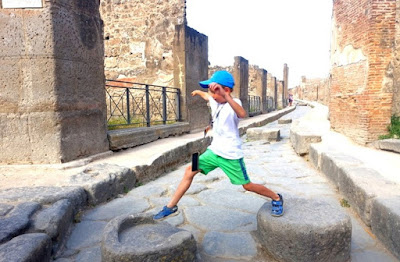The term ‘perfect tense’ can be understood in different ways
depending on what languages you know and so, to avoid complicating things, the
Latin perfect tense is, in English:
[i] the simple past i.e. I went, and [ii] the
present perfect i.e. I have gone
Latin does not distinguish between the two. Most often,
however, it is translated as [i] i.e. I, you etc. did something – usually once
and finished.
To create the perfect tense you need to know [i] 1 set of
endings which applies to all verbs in the perfect tense and [ii] The third
principal part.
The principal parts are like English swim – swam - swum i.e.
you need those to be able to form all the tenses.
Until now, only two principal parts have been given:
portō, portāre [1]: carry
Those two parts tell you the conjugation to which the verb
belongs and from which you can form the [i] present, [ii] imperfect and [iii]
future tenses as well as [iv] the imperative / command forms:
Latin tutorial videos on Youtube on the verb forms covered
so far:
[1] present tense:
https://www.youtube.com/watch?v=VTl7H0WFwbE
[2] imperfect tense:
https://www.youtube.com/watch?v=3-OLocTTe50
[3] future tense:
https://www.youtube.com/watch?v=9FTBG0Jg6Cg
[4] imperative:
https://www.youtube.com/watch?v=2FLimwTryE4
For most Latin verbs there are two more principal parts. For
now, we’ll only look at the third principal part [image #1].
[1] portō [2] portāre │ [3] portāvī
Different tenses and verb forms can be created from this
third part but the one that is crucial is the perfect tense. If you’re aiming
to read the literature – especially narrative - then you’ll be reading about
what people did and this is the tense that will occur most
often.
[i] It is the 1st person singular that is listed: portāv │ī
[ii] portāv- is the stem; that’s what you need to
know
[iii] To that stem the following endings are added:
portāv│ī: I (have) carried
portāv│istī: you [sg.] (have) carried
portāv│it: he / she / it (has) carried
portāv│imus: we (have) carried
portāv│istis: you [pl.] (have) carried
portāv│ērunt: they (have) carried
Those endings [image #2] are for the perfect tense of all
four conjugations and so, for any verb, they are simply added to the stem of
the third principal part.
[iv] Almost all 1st conjugation verbs have this stem ending
in -v- e.g.
hurry: festīnō, festīnāre, │ festīnāvī
love: amō, amāre │ amāvī
praise: laudō, laudāre, │ laudāvī
sail: nāvigō, nāvigāre, │ nāvigāvī
watch: spectō, spectāre │ spectāvī
work: labōrō, labōrāre │ labōrāvī
[v] So, it’s simply the stem + the ending
festīnāvī [festīnāv + ī]: I (have) hurried
amāvistī [amāv + istī]: you [sg.] (have) loved
laudāvit [laudāv + it]: he / she / it (has)
praised
nāvigāvimus [nāvigāv + imus]: we (have) sailed
spectāvistis [spectāv + istis]: you [pl.] (have)
watched
labōrāvērunt [labōrāv + ērunt]: they (have)
worked
[vi] A few common verbs don’t have a stem in -v-:
dō, dare, ded¦ī [1]: give
stō, stāre, stet¦ī [1]: stand
But the same endings are always added:
dedimus: we gave
stetērunt: they stood









